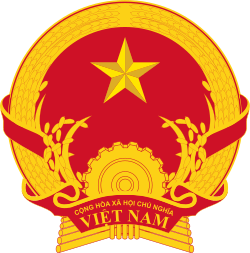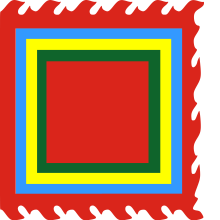Government of Vietnam
The Government of the Socialist Republic of Vietnam is the executive arm of the Vietnamese state, and the members of the Government are elected by the National Assembly of Vietnam.
 | |
| Formation | September 2, 1945 (original) July 2, 1976 (current form) |
|---|---|
| Jurisdiction | Vietnam |
| Legislative branch | |
| Legislature | National Assembly |
| Meeting place | National Assembly Building, Hanoi |
| Executive branch | |
| Leader | Prime Minister of Vietnam |
| Appointer | Election by legislature |
| Headquarters | Presidential Palace |
| Main organ | State Council |
| Judicial branch | |
| Court | Supreme People's Court |
| Seat | Hanoi |
 |
|---|
| This article is part of a series on the politics and government of Vietnam |
|
Ideology |
|
|
|
Legislative
|
|
Presidency
|
|
Executive
|
|
|
Military
|
|
|
See also
|
|
|
Council of Ministers (1980–2001)
The Vietnamese Council of Ministers was entrusted by the 1980 Constitution with managing and implementing the governmental activities of the state. It is described in that document as "the Government of the Socialist Republic of Vietnam, the highest executive state body of the highest body of state authority." It is accountable to the National Assembly of Vietnam, and, more directly, to the Vietnamese Council of State when the National Assembly is not in session. Its duties include submitting draft laws, decrees, and other bills to the National Assembly and the Council of State; drafting state plans and budgets and implementing them following the National Assembly's approval; managing the development of the national economy; organising national defence activities and assuring the preparedness of the armed forces; and organising and managing the state's foreign relations. Its membership includes a chairman, vice-chairman, cabinet ministers, and the heads of state committees, whose terms of office coincide with that of the National Assembly. The Council of Ministers includes its own standing committee, which serves to co-ordinate and mobilise the council's activities. In 1986 the standing committee was expanded from ten to thirteen members.
Each ministry is headed by a minister, who is assisted by two to twelve deputy ministers. The number and functions of the ministries are not prescribed in the Constitution, but in 1987 there were twenty-three ministries and a number of other specialised commissions and departments. In an apparent response to the call by the Sixth National Party Congress in 1986 for a streamlined bureaucracy, several ministries were merged. The former ministries of agriculture, food, and food industry were joined in a newly created Ministry of Agriculture and Food Industry. The ministries of power and mines were merged to form the Ministry of Energy, and a newly created Ministry of Labour, War Invalids, and Social Welfare consolidated the duties of three former ministries. The addition of two new ministerial bodies also resulted from the 6th National Party Congress: a Ministry of Information to replace the Vietnam Radio and Television Commission, and a mission for Economic Relations with Foreign Countries to act as a co-ordinating body for foreign aid.
Cabinet members
| Portfolio | Name | Member of Central Committee | Politburo | |
|---|---|---|---|---|
| Member | Rank | |||
| Prime Minister | Nguyễn Xuân Phúc | Yes | Yes | 6th |
| First Deputy Prime Minister | Vương Đình Huệ | Yes | Yes | 11th |
| Trịnh Đình Dũng | Yes | No | — | |
| Minister of Public Security | Tô Lâm | Yes | Yes | 5th |
| Minister of Justice | Lê Thành Long | Yes | No | — |
| Minister of Finance | Đinh Tiến Dũng | Yes | No | — |
| Minister of Industry and Trade | Trần Tuấn Anh | Yes | No | — |
| Minister of Labour, Invalids and Social Affairs | Đào Ngọc Dung | Yes | No | — |
| Minister of Transport | Trương Quang Nghĩa | Yes | No | — |
| Minister of Construction | Phạm Hồng Hà | Yes | No | — |
| Minister of Information and Communications | Nguyễn Mạnh Hùng | Yes | No | — |
| Minister of Education and Training | Phùng Xuân Nhạ | Yes | No | — |
| Minister of Agriculture and Rural Development | Nguyễn Xuân Cường | Yes | No | — |
| Minister of Planning and Investment | Nguyễn Chí Dũng | Yes | No | — |
| Minister of the Interior | Lê Vĩnh Tân | Yes | No | — |
| Minister of Science and Technology | Chu Ngọc Anh | Yes | No | — |
| Minister of Culture, Sports and Tourism | Nguyễn Ngọc Thiện | Yes | No | — |
| Minister of Natural Resources and Environment | Trần Hồng Hà | Yes | No | — |
| Minister of Health | Nguyễn Thị Kim Tiến (Retired)[1] | No | No | — |
| Head of the Office of the Government | Mai Tiến Dũng | Yes | No | — |
| Inspector-General of the Government | Lê Minh Khái | Yes | No | — |
| Governor of the State Bank | Lê Minh Hưng | Yes | No | — |
| Chairman of the Committee on Ethnic Minority Affairs | Đỗ Văn Chiến | Yes | No | — |

